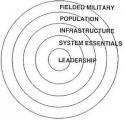Laws of War : Rights
and Duties of Neutral Powers and Persons in Case of War on Land (Hague V); October 18, 1907
V - CONVENTION RESPECTING THE RIGHTS AND DUTIES OF NEUTRAL POWERS AND PERSONS IN CASE OF WAR ON LAND
With a view to laying down more clearly the rights
and duties of neutral Powers in case of war on land and regulating the position of the belligerents who have taken refuge in neutral territory;
Being likewise desirous of defining the meaning of the term "neutral," pending the possibility of settling, in its entirety, the position of neutral individuals in their relations with the belligerents;
.....
CHAPTER I The Rights and Duties of Neutral Powers
Article 1.
The territory of neutral Powers is inviolable.
Art. 2.
Belligerents are forbidden to move troops or convoys of either munitions of war or supplies across the territory of a neutral Power.
Art. 3.
Belligerents are likewise forbidden to:
(a) Erect on the territory of a neutral Power a wireless telegraphy station or other apparatus for the purpose of communicating with belligerent forces on land or sea;
(b) Use any installation of this kind established by them before the war on the territory of a neutral Power for purely military purposes, and which has not been opened for the service of public messages.
Art. 4.
Corps of combatants cannot be formed nor recruiting agencies opened on the territory of a neutral Power to assist the belligerents.
Art. 5.
A neutral Power must not allow any of the acts referred to in Articles 2 to 4 to occur on its territory.
It is not called upon to punish acts in violation of its neutrality
unless the said acts have been committed on its own territory.













Bookmarks